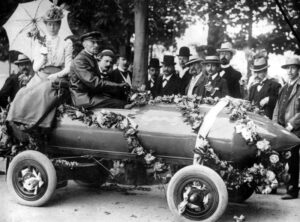We’ve got a little update for you: our electric car fleet has grown to a family of five! Finance Director Yvette and Project Manager Chris now have electric cars too, taking us another step forward in our sustainability journey.
In our drive to becoming fully electric, we’ve already seen a massive difference – spending £15,518.36 less on fuel from October 2022 to September 2023, compared to the year prior. Those figures will be even better for the current period, as our company cars are all electric now – and will be going forward.
But… did you know that the electric car movement isn’t all that new? La Jamais Contente, a torpedo-shaped car, was the first ever road vehicle to top 100km/h. It was electric. And the year was 1899!

Image credit: Wikimedia Commons
Electric Vehicles Of The Past
Battery-powered taxis buzzed around London and New York in the 1890s and early 1900s. In fact, there were more than 30,000 electric vehicles registered in the US at a time when the most common form of transportation was still the horse and carriage. Their popularity dwindled due to an absence of power infrastructure beyond big cities, and fuel-powered vehicles soon dominated instead.
Why Are Electric Cars Back?
So, why have we come full circle? Along with environmental concerns, it’s taken more than a century of battery improvements for electric vehicles to become a viable, appealing alternative to fuel-powered cars. The number of sales has tripled between 2020 and 2022, and although the electric car market accounts for less than 20% of all car sales, the prediction is that they will overtake within the next 15 years.
That’s thanks to a number of developments.
- In 2022, an electric Mercedes travelled over 1,000km through four countries on a single charge. Since then, Toyota and Volkswagen have both announced plans to begin commercial production of next-generation batteries, allowing people to travel roughly double the distance of current petrol or diesel cars without charging.
- The likes of Ford, General Motors, Jaguar Land Rover and Volvo have set targets of phasing out the production of cars with internal combustion engines entirely by 2040.
- Engineering firm CALLUM aims to cut charging times to just a few minutes, making the process as convenient as refuelling. Along with Cambridge-based battery developer Nyobolt, the companies have showcased an electric vehicle capable of fully charging in less than six minutes. Mass production is set to begin as soon as this year.

The Future Of Electric Cars
With these updates, the understandable concerns around reliability and functionality will potentially become a thing of the past. There are still concerns over price (the average cost to buy an electric car in the UK is £50,000) and practicality en masse – such as, how will a row of terraced houses in compact cities charge their cars at home safely?
More recently in America, there have been concerns over electric cars’ inability to withstand cold weather – but by cold weather, we mean -35°C. Which is, thankfully, a temperature that’s never been recorded in the UK.
One thing’s for sure, we’ll be keeping our ears to the ground for further developments in the electric car market. Let’s all watch this space!
